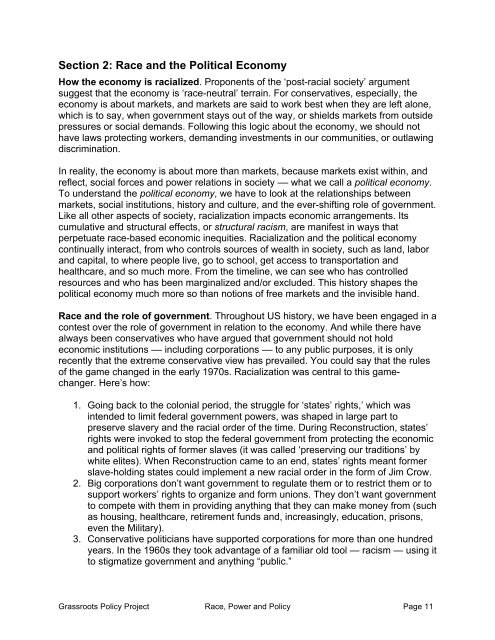Institutional Racism
Institutional Racism
Institutional Racism
You also want an ePaper? Increase the reach of your titles
YUMPU automatically turns print PDFs into web optimized ePapers that Google loves.
Section 2: Race and the Political Economy<br />
How the economy is racialized. Proponents of the ‘post-racial society’ argument<br />
suggest that the economy is ‘race-neutral’ terrain. For conservatives, especially, the<br />
economy is about markets, and markets are said to work best when they are left alone,<br />
which is to say, when government stays out of the way, or shields markets from outside<br />
pressures or social demands. Following this logic about the economy, we should not<br />
have laws protecting workers, demanding investments in our communities, or outlawing<br />
discrimination.<br />
In reality, the economy is about more than markets, because markets exist within, and<br />
reflect, social forces and power relations in society –– what we call a political economy.<br />
To understand the political economy, we have to look at the relationships between<br />
markets, social institutions, history and culture, and the ever-shifting role of government.<br />
Like all other aspects of society, racialization impacts economic arrangements. Its<br />
cumulative and structural effects, or structural racism, are manifest in ways that<br />
perpetuate race-based economic inequities. Racialization and the political economy<br />
continually interact, from who controls sources of wealth in society, such as land, labor<br />
and capital, to where people live, go to school, get access to transportation and<br />
healthcare, and so much more. From the timeline, we can see who has controlled<br />
resources and who has been marginalized and/or excluded. This history shapes the<br />
political economy much more so than notions of free markets and the invisible hand.<br />
Race and the role of government. Throughout US history, we have been engaged in a<br />
contest over the role of government in relation to the economy. And while there have<br />
always been conservatives who have argued that government should not hold<br />
economic institutions –– including corporations –– to any public purposes, it is only<br />
recently that the extreme conservative view has prevailed. You could say that the rules<br />
of the game changed in the early 1970s. Racialization was central to this gamechanger.<br />
Here’s how:<br />
1. Going back to the colonial period, the struggle for ‘states’ rights,’ which was<br />
intended to limit federal government powers, was shaped in large part to<br />
preserve slavery and the racial order of the time. During Reconstruction, states’<br />
rights were invoked to stop the federal government from protecting the economic<br />
and political rights of former slaves (it was called ‘preserving our traditions’ by<br />
white elites). When Reconstruction came to an end, states’ rights meant former<br />
slave-holding states could implement a new racial order in the form of Jim Crow.<br />
2. Big corporations don’t want government to regulate them or to restrict them or to<br />
support workers’ rights to organize and form unions. They don’t want government<br />
to compete with them in providing anything that they can make money from (such<br />
as housing, healthcare, retirement funds and, increasingly, education, prisons,<br />
even the Military).<br />
3. Conservative politicians have supported corporations for more than one hundred<br />
years. In the 1960s they took advantage of a familiar old tool — racism — using it<br />
to stigmatize government and anything “public.”<br />
Grassroots Policy Project Race, Power and Policy Page 11

















